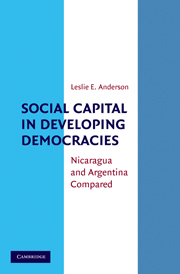1 - An Introduction
Published online by Cambridge University Press: 05 June 2012
Summary
There is no faith in America, between either men or nations. Treaties are papers; constitutions books; elections combat; liberty, anarchy, and life, a torment.
Simon Bolivar, Mirada Sobre America española… conflicts are more threatening among people who distrust one another. Public contestation requires a good deal of trust in one's opponents. They may be opponents but they are not implacable enemies.
Robert Dahl, PolyarchyOur mutual faith in each other is one fundamental essence of democracy. We must have faith that if we lose (an election, an argument) to “the other,” we and our interests will nonetheless live to see another day, to make another argument, to discuss another issue, to contest another election. We will not be destroyed forever by our loss today. Some scholars have called this faith in the system and argued that participants must believe that the system will protect them, within reasonable limits, even if they are the (temporary) losers. Moreover, that same system will provide them a level playing field so that, come the next contest, they will have every advantage and at least a reasonable likelihood of winning the next round. But the system, of course, consists of both the citizen members within it and the institutional framework around it. We must trust each other, or trust our institutions, or both before we can trust the system. The ability to trust one another, cooperate, and work together is a valuable asset in the development, consolidation, and continuation of democracy.
- Type
- Chapter
- Information
- Social Capital in Developing DemocraciesNicaragua and Argentina Compared, pp. 1 - 24Publisher: Cambridge University PressPrint publication year: 2010

